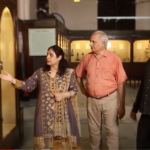An Indo-Pak friendship born in the United States underlines the shared value of women’s empowerment
Sightings of women driving pink rickshaws around Lahore have seized global media attention about the initiative to enfranchise women, those seeking to supplement their livelihood as well as those seeking safe passage.
I first heard about the Pink Rickshaw being voiced as a concept at the work desk of my ever-active khala (mother’s sister), Zar Aslam, when I was on a visit from Rwanda to see family in Lahore some time back.
That’s when I learnt that the Pink Rickshaw initiative symbolises an Indo-Pak friendship transcending borders. It was Kalpana Trivadi, a non-resident Indian in California, who sponsored the first rickshaw. Zar, the founder of the non-profit The Environment Protection Fund sponsoring the initiative, describes Kalpana as, “My sounding board, my anchor and my spring board.”
Now both in their fifties, they could not have guessed when they first met that their friendship would last over three decades. Zar Aslam’s father was Maj. Gen. Rehmat Ali Shah Bokhari, who fought on the frontline of two Indo-Pak wars. Then there were the stories of what happened during Partition that Zar heard, growing up in army cantonments.
Despite welcoming visiting Hindu-born cousins visiting from India, she never imagined that Indians and Pakistanis could be friends. “I thought we didn’t share the same values,” she says, “that we were supposed to be enemies.”
When she started studying at the University of Kansas, Lawrence (KU), her first Indian friend teased her, “Did you expect we would have horns?”
In contrast, Kalpana grew up in cosmopolitan Bombay, where supporting the Pakistan team as well as the Indian cricket team was acceptable. “There was no focus on Pakistan as enemies… In school, we grew up learning about every religion and celebrating every festival,” she told me on the phone, speaking from Silicon Valley, California.
It was at KU that Zar and Kalpana became passing acquaintances, though not more, notes Zar, because Pakistanis and Indians tended to socialise in separate circles.
They met again later in Silicon Valley, having joined the same telecommunications company. “I had no family in California. Kalpana became family for me. She nursed me back to health following surgeries and downtime. She was like sunshine in the morning. We travelled together and we would laugh non-stop. She came from a similarly large family, and her father, V. D. Trivadi of the Times of India, like my grandfather Salahuddin Ahmed, was an eminent writer. Our values about women’s empowerment and the environment matched. When our mothers met, they became very fond of each other.”
The inspiration for the Pink Rickshaw initiative came years later, when back in Lahore, Zar learnt that the female staff at her non-government organisation The Environment Protection Fund, were having commuting troubles. One woman waiting for transport on the main road on a hot day when few were around “returned in tears” after a rickshaw driver harassed her.
Zar Aslam started lending golf clubs to female colleagues as a defence for their public commutes. And she was reminded of her own experiences. A Silicon Valley executive in the ’80s and ’90s, she sold telecommunications innovations in over 20 South American, Asian and African countries. In Buenos Aires a taxi driver insisted on serenading her, singing and driving fast, ignoring her pleas to slow down; she escaped when he stopped at a traffic light. In Beijing, the driver of a taxi she took from the airport late at night locked the doors and refused to answer, until she mentioned that her colleagues were expecting her at her hotel (They were not).
“The first time I mentioned the Pink Rickshaw to Kalpana over the phone last year, she became extremely excited,” remembers Zar. “She told me I had to do it and that the first rickshaw would be on her.”
“I believe it is our moral imperative as women to help each other, and the Pink Rickshaw allows me to do just that,” says Kalpana. “I am honoured to be a part of this initiative. The Pink Rickshaw is about empowering women to own their lives and livelihood. When Zar talked about it, I knew right away that it was an incredible opportunity for women, and that I wanted to help her make a difference, make this vision a reality. There are no political or religious overtones to anything we do, just social. It is as Zar says, women without borders. The good we do transcends boundaries.”
The Pink Rickshaw scheme has so far launched five rickshaws through The Environment Protection Fund, a five year old non-profit that works with schoolchildren in Lahore, Multan and Mansehra to clean localities, plant trees and promote interfaith harmony. The NGO is registered in California, where Kalpana handles its administrative affairs and volunteers on its Board of Directors. Without that, says Zar, the non-profit would have “remained a dream.”
Kalpana’s moral support has also been imperative for the Pink Rickshaw initiative, says Zar. When donors turned her down, she lost her confidence. “It was Kalps who came to the rescue, validating the concept and filling the funding gap for the first rickshaw!”
But the real hero, asserts Kalpana, is Zar. “She is a true visionary. Her initiatives for women and the environment make the world a better place.”
Having launched five women-driven rickshaws on the road, the Initiative is planning to add a further 15, for which it is training women over the coming months. Funding to acquire rickshaws remains a bottleneck; the initiative is so far dependent on personal donations. Each rickshaw costs Rs 300,000 (almost USD 3,000). The women are quick learners according to their trainer Amir Anwar, himself a rickshaw driver. They have been taught not only to drive, but also elementary mechanics in order to fix minor problems.
The rickshaws are leased out to selected women after a diligent process of verifying identities and addresses, and family interviews to confirm their support. The women are also required to attend monthly meetings to discuss social, economic and mechanical issues.
The drivers can choose their own routes and rates, as long as they cover their monthly instalments – designed to repay the cost of the rickshaw over two years. After that, ownership will be transferred to the drivers.
Imaduddin Ahmed consults in Rwanda. He tweets @ImadAhmed. Email Pink Rickshaw at: [email protected]. Donations can be made at this crowd-funding site.













